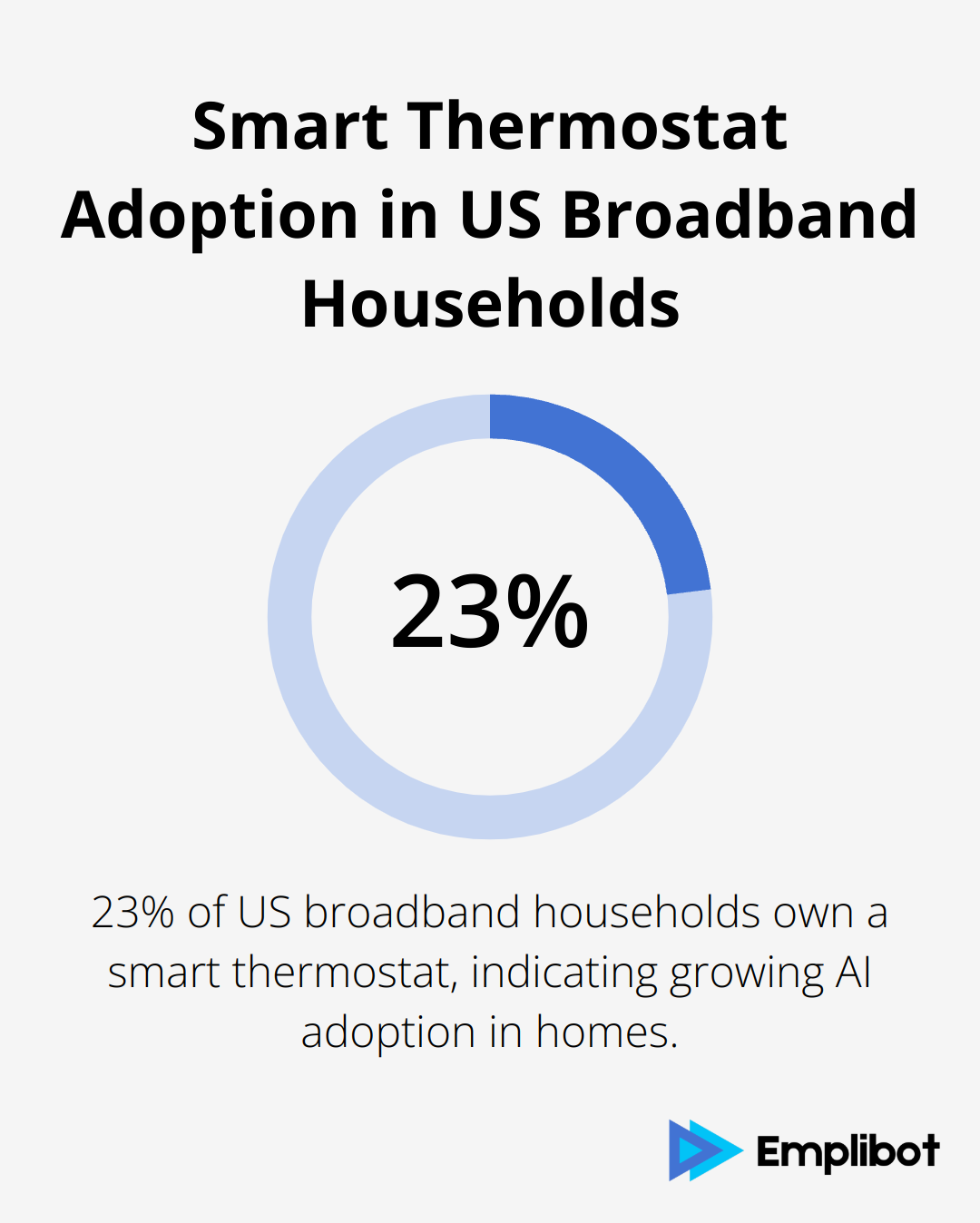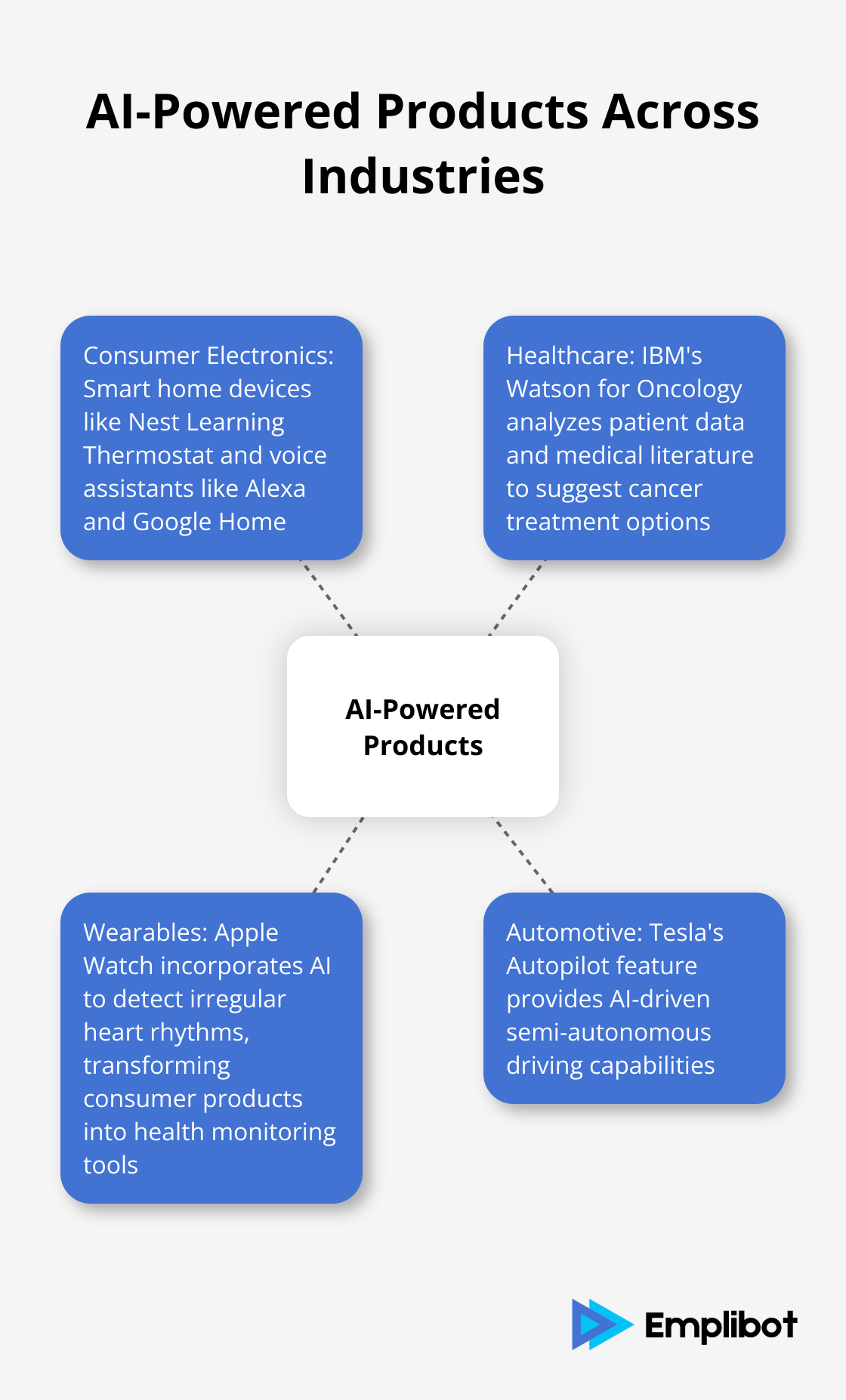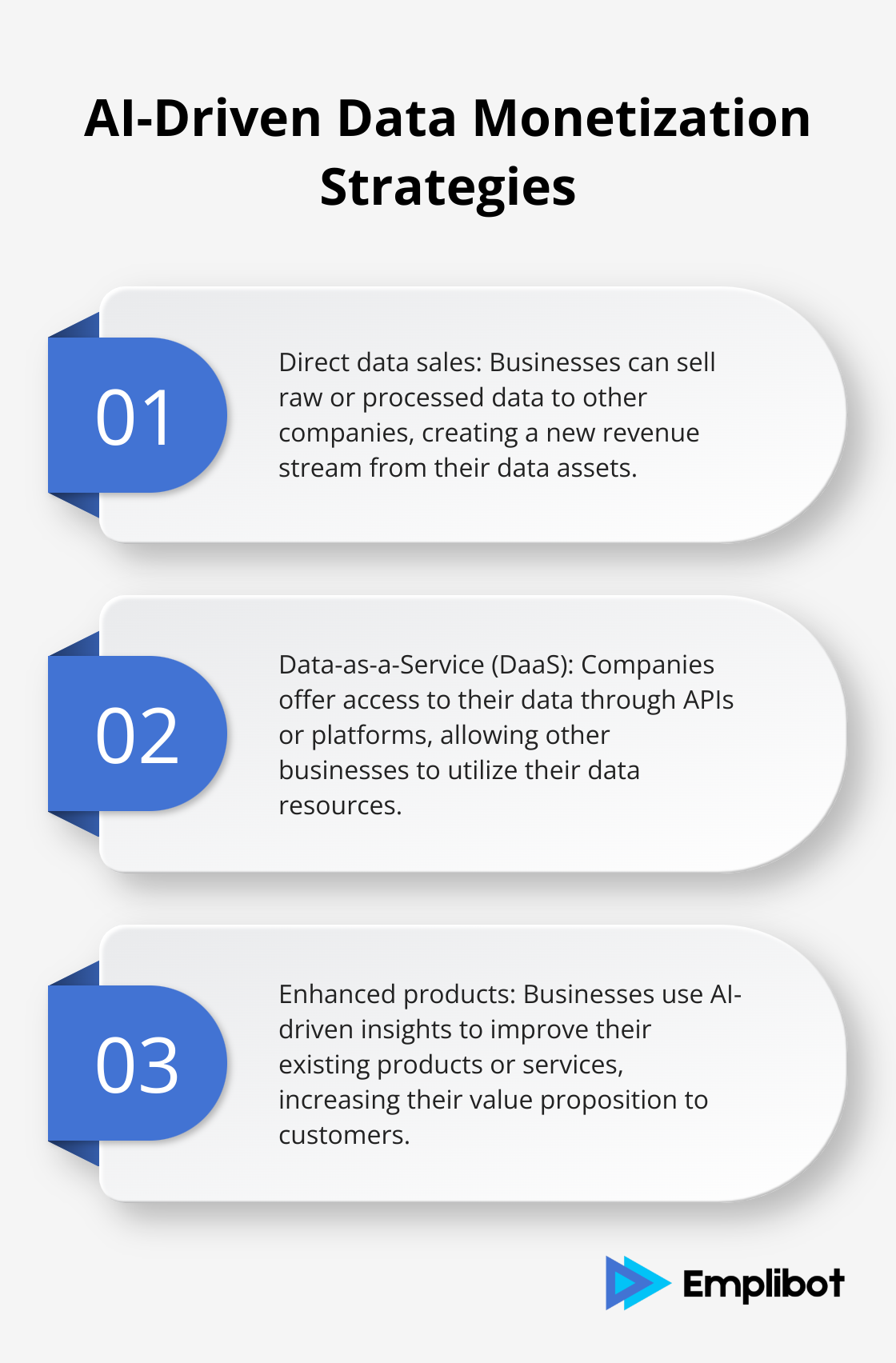At Emplibot, we’ve seen AI revolutionize countless industries. The potential for businesses to leverage artificial intelligence is immense, but understanding how to monetize it can be challenging.
In this post, we’ll explore various AI business models that are reshaping the corporate landscape. From AI as a Service to data monetization, we’ll break down the key strategies companies are using to turn AI into a profitable venture.
Contents
ToggleAI as a Service (AIaaS): Revolutionizing Business Intelligence
Defining AIaaS and Its Impact
AI as a Service (AIaaS) transforms how businesses access and implement artificial intelligence technologies. This model enables organizations to access artificial intelligence (AI) through a third-party offering, allowing companies to leverage AI capabilities without extensive in-house expertise or infrastructure.
Major Players in the AIaaS Landscape
The AIaaS space includes giants like Amazon Web Services (AWS), Google Cloud, Microsoft Azure, and IBM Watson. Each platform offers unique features and pricing models. AWS SageMaker provides tools for building, training, and deploying machine learning models, while Google Cloud AI offers pre-trained models for various applications.
Practical Applications of AIaaS
Businesses across industries adopt AIaaS for numerous applications:
- Customer Service: AI-powered chatbots provide 24/7 customer support.
- Sales and Marketing: Predictive analytics forecast customer behavior and optimize marketing campaigns.
- Supply Chain Management: AI algorithms optimize inventory and logistics.
Accenture defines AI maturity and recommends 5 ways to advance and accelerate AI business transformation, highlighting the potential of AIaaS adoption.
Selecting the Right AIaaS Provider
When choosing an AIaaS provider, businesses must consider factors such as scalability, integration capabilities, and pricing models. It’s essential to assess specific business needs and align them with different providers’ offerings.
The Future of AIaaS
As AIaaS continues to evolve, we expect to see more specialized offerings tailored to specific industries and use cases. The next frontier in AI business models lies in AI-powered products and services, which we’ll explore in the following section.
Here’s the modified chapter with the requested changes:
How AI-Powered Products Transform Industries
AI in Consumer Electronics
AI-powered products and services reshape industries, offering unprecedented efficiency and innovation. The consumer electronics sector has seen a surge in AI-enhanced products. Smart home devices like the Nest Learning Thermostat use AI algorithms to learn user preferences and optimize energy consumption. A study by Parks Associates found that 23% of US broadband households own a smart thermostat, which highlights the growing adoption of AI in everyday products.

Amazon’s Alexa and Google Home have become household names, demonstrating the power of AI in voice-activated assistants. These devices not only respond to commands but also learn from user interactions to provide personalized experiences.
AI-Driven Healthcare Solutions
In healthcare, AI makes significant strides. IBM’s Watson for Oncology analyzes patient data and medical literature to suggest treatment options for cancer patients. A study published in the Annals of Oncology showed that Watson’s recommendations matched those of oncologists in 93% of cases, which showcases the potential of AI in medical decision-making.
Wearable devices like the Apple Watch now incorporate AI to detect irregular heart rhythms. In a Stanford Medicine study, the Apple Watch’s ECG app accurately identified atrial fibrillation in 84% of participants, demonstrating how AI can transform consumer products into powerful health monitoring tools.
Monetization Strategies for AI Products
Companies adopt various strategies to monetize AI-powered offerings. Subscription models are popular, especially for software-based AI services. Adobe’s Creative Cloud (which includes AI-powered features like content-aware fill) operates on a subscription basis, providing a steady revenue stream.
Premium pricing is another approach. Tesla’s Autopilot feature, an AI-driven semi-autonomous driving system, assists vehicles with steering, accelerating, and braking for other vehicles and pedestrians. This strategy allows companies to differentiate their products and capture higher margins from customers willing to pay for advanced AI capabilities.
Data monetization also emerges as a lucrative model. Fitbit, for instance, anonymizes and aggregates user data to sell insights to healthcare providers and insurers, creating an additional revenue stream beyond device sales.
Implementing AI-Powered Products
For businesses looking to implement AI-powered products or services, it’s important to align the monetization strategy with the value provided. Companies should consider factors such as development costs, target market, and competitive landscape when pricing AI offerings.

As AI continues to evolve, we expect to see more innovative products and services across industries. The key to success lies in creating AI solutions that address real customer needs and deliver tangible benefits. Companies that focus on practical applications and clear value propositions can effectively leverage AI to drive growth and stay ahead in an increasingly competitive landscape.
The next frontier in AI business models involves the monetization of data through AI technologies. This approach opens up new opportunities for businesses to extract value from their data assets while navigating complex ethical considerations.
How Can Businesses Profit from AI-Driven Data Monetization?
The Gold Mine of AI-Ready Data
Data monetization through AI transforms businesses across industries. Companies leverage their data assets to create new revenue streams and enhance existing products and services.
Not all data holds equal value for AI applications. The most valuable types include:
- User behavior data: This encompasses clickstream data, purchase history, and app usage patterns.
- Sensor data: IoT devices generate vast amounts of data.
- Text and image data: These unstructured data types power natural language processing and computer vision applications.
Effective Data Collection and Processing Methods
To monetize data effectively, businesses need robust collection and processing methods:
- Data lakes: These centralized repositories allow companies to store vast amounts of raw data. Amazon’s data lake solution enables businesses to break down data silos and prepare data for AI applications.
- Edge computing: This approach processes data closer to its source, reducing latency and bandwidth usage.
- Federated learning: This technique allows AI models to train across multiple decentralized devices without exchanging data samples.
Navigating the Ethical Considerations of Data Monetization
Data monetization offers significant opportunities but also raises ethical concerns:
- Privacy protection: Companies must maintain transparency about data collection and usage.
- Bias mitigation: AI models can perpetuate and amplify biases present in training data.
- Data ownership: Clear policies on data ownership and usage rights are essential.
To address these ethical considerations, businesses should implement robust data governance frameworks. This includes appointing data ethics officers, conducting regular audits, and involving stakeholders in decision-making processes related to data monetization.
Monetization Strategies for AI-Driven Data
Companies can adopt various strategies to monetize their data through AI:

AI-driven data monetization is becoming increasingly prevalent, with top companies, governments, researchers, and startups showcasing how they’re already using Google’s AI solutions to transform their operations and create value.
Final Thoughts
AI business models reshape the corporate landscape, offering unprecedented opportunities for innovation and growth. Companies must carefully assess their strengths, market position, and target audience to determine the most suitable approach. The future of AI monetization promises more specialized and industry-specific solutions, with trends pointing towards AI integration into existing products and services.
AI continues to advance, and businesses that adapt and innovate will thrive in this rapidly evolving field. The key to success lies in creating tangible value for customers through AI-powered capabilities, enhanced products, or data-driven insights. As AI transforms various industries, companies must stay informed about the latest trends and select the right AI business model for their needs.
At Emplibot, we understand the transformative power of AI in content marketing. Our AI-powered content automation platform helps businesses streamline their content creation and distribution processes. This demonstrates how AI can drive efficiency and growth across various industries, showcasing the potential of AI business models to revolutionize traditional practices.


![AI Marketing: Lead Generation [Guide]](https://wp.emplibot.com/wp-content/uploads/emplibot/ai-marketing-lead-generation-1753859292-768x456.jpeg)
![AI Marketing: Predictive Lead Scoring [Guide]](https://wp.emplibot.com/wp-content/uploads/emplibot/predictive-lead-scoring-1753772819-768x456.jpeg)

![Google Autocomplete for Keyword Research [Guide]](https://wp.emplibot.com/wp-content/uploads/emplibot/google-autocomplete-for-keyword-research-1753600089-768x456.jpeg)




